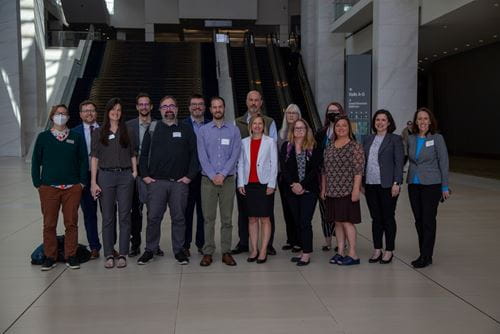The web Browser you are currently using is unsupported, and some features of this site may not work as intended. Please update to a modern browser such as Chrome, Firefox or Edge to experience all features Michigan.gov has to offer.
Climate Liaisons break down barriers to build up climate response
September 27, 2023
Some say it’s the nature of government and large organizations to be siloed, with branches or offices self-focused and unwilling or unable to cross boundaries and team up effectively. How can such organizations confront a challenge as big as climate change?

EGLE Climate Liaison members gather at Michigan's first MI Healthy Climate Conference held April 11-12, 2023 in Detroit.
Tear down the walls. That’s what the Michigan Department of Environment, Great Lakes, and Energy’s (EGLE) Office of Climate and Energy (OCE) did in summer 2022, forming a standing intradepartmental group to advance the goals of the MI Healthy Climate Plan (MHCP) across all of EGLE’s offices and divisions – supplementing OCE’s work on climate action goals with other agencies outside of EGLE.
Michigan Climate and Energy Advisor Cory Connolly and his OCE colleagues Sarah Hutchinson and Jamie Scripps meet each month with this group of 29 Climate Liaisons from each of EGLE’s 15 other divisions and offices:
- Three each from the Drinking Water and Environmental Health Division, Office of the Environmental Justice Public Advocate, Materials Management Division, and Water Resources Division.
- Two each from the Air Quality Division, Office of the Clean Water Public Advocate, Environmental Support Division, Finance Division, Office of the Great Lakes, Office of Legislative Affairs, and Remediation and Redevelopment Division.
- One each from Information Management Division; Oil, Gas, and Minerals Division; and Office of Public Information.
Air Quality Division
- Developing baseline emissions data to inform the Port of Detroit’s decarbonization efforts.
- Drafting sample compliance projects in support of the MHCP that violators can use for guidance.
Materials Management
- Developing resources on how to properly cap landfills with renewables siting in mind and how to site when capped.
- Continuing to work with Air Quality and Remediation and Redevelopment to set a baseline and provide a road map or strategic framework to reduce methane emissions.
Oil, Gas, and Minerals
- Drafting quantifiable estimates methane emissions from orphan wells and how much progress can be made towards our emission reduction goals by plugging them.
- Pursuing funding for additional monitors and equipment for Remote Sensing to keep pace with validating emissions reductions to meet upcoming regulations for facilities.
Drinking Water and Environmental Health Division
- Collaborating with other EGLE divisions to create online educational materials on drinking water safety, sampling efforts, and efficiency measures such as regionalization.
- Working with other divisions to develop and integrate Environmental Justice-related metrics and requirements into funding mechanisms including the State Revolving Funds (SRF).
Finance Division
- Working across divisions to develop an updated scoring scheme based on definitions in the MHCP and Justice40, a policy to direct at least 40% of the overall benefits of certain federal investments to communities that are marginalized, underserved, and overburdened by pollution.
- Exploring how to use Justice40 definitions in tandem with previously identified overburdened communities for more insight into where and how money is being invested.
Clean Water Public Advocate
- Partnering with Materials Management to find municipal partners interested in water leak pilot projects, possibly leveraging MIGreenCommunities and MINextCities.
- Exploring how the State Energy Program could help enable development of a water decarbonization road map.
Environmental Justice Public Advocate
- Exploring how pass-through grants and other funding mechanisms can facilitate genuine community engagement through trusted community organizations.
- Establishing regular meetings among relevant parties to ensure consistent engagement and communication on Justice40 with equitable representation.
Great Lakes
- Using the Michigan Department of Transportation’s Carbon Reduction Strategy and Port of Detroit decarbonization to create a framework to be implemented in other ports.
- Connecting with Environmental Support to develop communications materials and leverage subject-matter expertise from existing workgroups.
Legislative Affairs
- Establishing regular meetings with OCE to discuss bills needing analysis and timelines for action.
- Evaluating statutory programs that could hinder or further progress toward MHCP goals."
Remediation and Redevelopment
- Continuing to work with Materials Management, EPA, and the Michigan Department of Natural Resources on siting of renewables on state-owned brownfields, landfills, and mines.
- Collaborating with Information Management on needed improvements to EGLE Mapper and/or other state tools used in brownfield renewables siting.
To build on this work, the OCE met one-on-one with each division and office to encourage further development of strategic priorities toward enacting the MHCP and overcoming challenges and barriers to implementation.
Who’s who?
Here are current Climate Liaisons by division or office:
- Air Quality - Breanna Bukowski and Christopher Ethridge.
- Clean Water Public Advocate - Kristina Donaldson and Emily Posthumus.
- Drinking Water and Environmental Health - Eric Oswald, Suzann Ruch, and Ian Smith.
- Environmental Justice Public Advocate - Kate Hutchens, Katherine Lambeth, and Regina Strong.
- Environmental Support - Jennifer Acevedo and Lisa Herron.
- Finance - Elizabeth Lounds and Paul McDonald.
- Great Lakes - Simon Belisle and Emily Finnell.
- Information Management - Kate Berg.
- Legislative Affairs - Travis Boeskool and Jessica Isler.
- Materials Management - Elizabeth Browne, Julie Staveland, and Kristine Lauckner.
- Oil, Gas, and Minerals - Jason Mailloux.
- Public Information - Jeff Johnston.
- Remediation and Redevelopment - Julie Lowe and Ashley Coplin.
- Water Resources - Phil Argiroff, Jerrod Sanders, and Jennifer Laudazio.